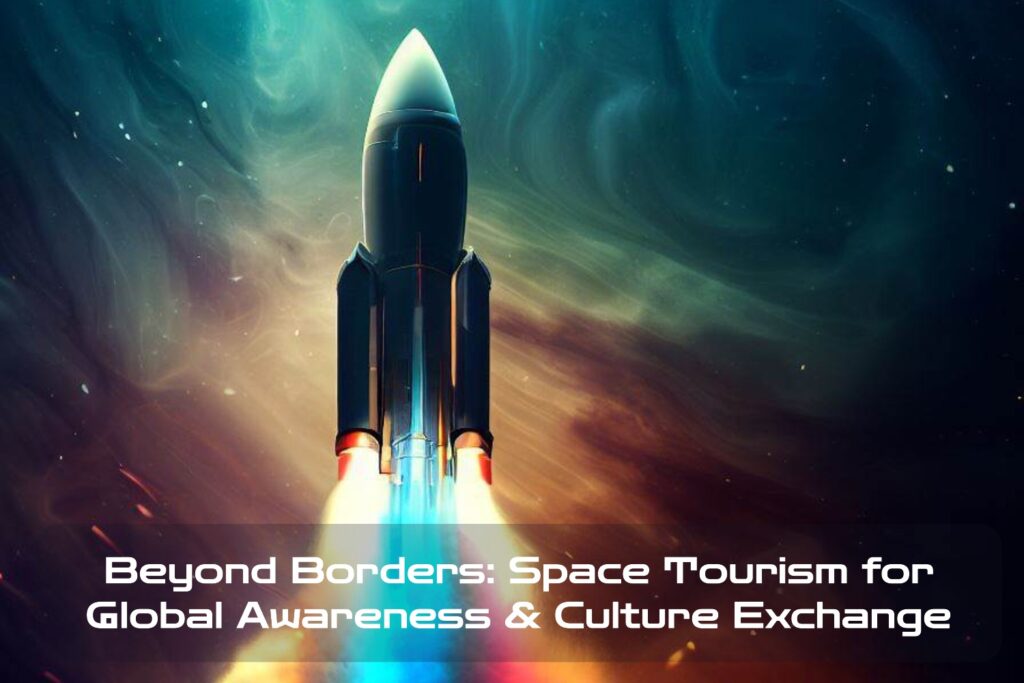The Rise of Space Tourism
Space tourism is no longer a fantasy limited to science fiction. With the advent of private space companies such as SpaceX and Blue Origin, everyday people are closer than ever to traveling to space. These companies are working hard to make space travel more accessible and affordable, with the goal of transforming it into a thriving industry.
In recent years they launched and successfully completed their first flights with civilians aboard. As more people begin to venture beyond Earth’s atmosphere, the possibilities for promoting global awareness and cultural exchange become increasingly exciting.
Why is Space Tourism Becoming so Popular?
There are several reasons why space tourism has gained traction in recent years. First, it satisfies humanity’s innate desire for exploration and adventure.
For centuries, people have been fascinated by the idea of traveling beyond our planet, but until now, that has been reserved for only a select few. With private companies offering commercial trips to space, this dream can now be realized by anyone with enough money and willingness.
Secondly, advancements in technology have made it possible for private companies to offer these experiences at less exorbitant prices than previously thought possible. With reusable rockets being developed by SpaceX and other similar companies, costs will likely continue to decrease.
The Potential Impact of Space Tourism

It’s not just about fulfilling our innate desire for exploration – there are other significant impacts that space tourism could have on society as well. By enabling people from different parts of the world to come together on such an extraordinary journey, cultural barriers may be broken down in ways that were previously unthinkable. Additionally, seeing Earth from space could shift one’s perspective dramatically – something some astronauts have reported after their missions in orbit around our planet – especially when considering environmental responsibility or social divides that we often forget about when we’re caught up in day-to-day living on Earth’s surface.
In the following sections, we will explore this idea further by discussing
- how space travel can change our perspective as humans,
- how it can bring people from different cultures together and stimulate local economies,
- what role governments play in regulating sustainable space tourism,
- what challenges we face in realizing this future,
- and ultimately why space tourism is worth pursuing as a society.
The mind-bending perspective shift of space travel
Space travel has always held a certain mystique for humans. Since the first manned mission to the Moon, we’ve been captivated by the idea of exploring beyond our own planet. However, it’s not just about curiosity and the desire for discovery.
Space travel has also had a profound impact on human perspective. One of the most significant ways in which space travel affects our worldview is through what’s known as “the overview effect.” This term was coined by writer and space philosopher Frank White, who described it as a phenomenon experienced by astronauts when they see Earth from space.
The experience causes them to have a profound shift in their understanding of Earth and humanity’s place within it. From space, Earth appears small and vulnerable, suspended in an infinite void of darkness.
The beauty of our planet is palpable from this vantage point, and it becomes clear that borders are arbitrary lines drawn by humans. Astronauts who have experienced this view speak about how they felt overwhelmed with emotion at seeing such beauty but also realized how fragile and interconnected our planet is.
Apollo 14 astronaut Edgar Mitchell famously said:
“You develop an instant global consciousness, a people orientation, an intense dissatisfaction with the state of the world…”
Astronaut Ron Garan echoed Mitchell’s statement when he said:
“In space, I saw ‘Earth Without Borders’. From 220 miles up, you could see no national boundaries or cultural differences.”
Other astronauts who have spoken out about their changed perspectives include Chris Hadfield and Helen Sharman. These individuals’ experiences underscore how transformative seeing Earth from space can be – not just for astronauts but potentially for all humans if we were able to see our planet from that unique vantage point ourselves.
How The Overview Effect Changes Us
It’s one thing to hear that seeing the earth from space can change your perspective; it’s another to consider what that actually means in practice. The overview effect can be a powerful tool for promoting global awareness and cultural exchange.
For one, it can make clear just how much we are all interconnected. From space, there are no borders, no nationalities, and no divisions.
It’s hard to deny that seeing our planet this way would make it easier for us to work together. Additionally, the experience of seeing Earth from space could lead to shifts in priorities and values.
Astronauts who have experienced the overview effect have spoken about feeling a deep sense of responsibility for caring for Earth and its inhabitants – all of them. It’s also worth noting that experiencing the overview effect need not be limited to astronauts alone.
While most people may never get to go into space, advances in technology such as virtual reality simulations offer a glimpse into what it’s like up there. Could VR simulations or other innovations allow us all to experience this perspective shift?
Looking Toward the Future
The potential for space travel and tourism is vast, but so too is its impact on humanity’s perspective. If managed carefully while considering environmental concerns, space travel could become an invaluable tool for promoting global understanding and cultural exchange.
At present, however, we’re only scratching the surface of what’s possible. One thing is certain: as more people venture into space over time – be they astronauts or tourists – we’ll continue learning more about ourselves and our place in the universe.
And who knows? Maybe someday we’ll even get to experience that mind-bending perspective shift ourselves – without ever leaving home!
Space Tourism as a Means for Cultural Exchange
Breaking down cultural barriers through shared experiences in space travel

Space tourism offers a unique opportunity for cultural exchange that is not easily replicated on Earth. The experience of space travel can bring people from diverse cultures together in a way that is not possible through traditional modes of tourism or diplomacy.
When individuals from different cultures share the same awe-inspiring experience of viewing our planet from space, it creates a shared connection that can break down cultural barriers. The idea of sharing this experience is not limited to just the passengers themselves.
Those who work in the space industry, including engineers, scientists, and flight crews, come from all over the world and contribute to creating an environment conducive to cross-cultural collaboration. Space tourism will leverage this global workforce and bring passengers into contact with people who may have completely different backgrounds and perspectives.
The power of immersive experiences in shaping our worldview
When individuals embark on a journey to space, they are stepping out of their comfort zones both physically and mentally. Being immersed in an environment without gravity, seeing Earth from afar, experiencing intense G-forces – these are all transformative experiences that can shift one’s perspective on life back on Earth.
This change in perspective can inspire travelers to be more open-minded towards other cultures and promote a greater appreciation for diversity. Moreover, being part of an exclusive club – i.e., those who have traveled to space – could also foster a sense of camaraderie among individuals who might otherwise have nothing else in common beyond their love for adventure.
Building bridges between nations through space cooperation
Historically, cooperation between nations regarding space exploration has been one avenue for diplomatic relations.
As private companies take over many aspects of the industry previously dominated by national governments, we will see increased opportunities for international partnerships and collaborations aimed at growing the commercial market for human exploration. By linking together the individual efforts of private companies, governments, and international organizations, space tourism could foster improved cooperation between countries – those in which launch pads are located and those not yet involved in the industry.
Space exploration can become a means for promoting peace and understanding between nations. Overall, space tourism has enormous potential for promoting cultural exchange by creating immersive experiences that foster global awareness and understanding.
It is a unique advancement in the realm of tourism and has the potential to change our perspective on what is considered “ordinary”. We should continue to embrace space travel as both an opportunity for adventure as well as bringing people together for cultural exchange.
The economic benefits of space tourism for local communities
Ground Control to Major Economic Boost: How Space Tourism Can Stimulate Local Economies

Space tourism isn’t just about the experience of a lifetime for the adventurous traveler. It can also have a significant impact on the local economies in areas with launch sites or training facilities.
The influx of tourists and revenue generated by space travel can create jobs, stimulate businesses, and support the growth of local communities. One example of this is Spaceport America, located in New Mexico.
The facility was built specifically to support commercial spaceflight and has become a hub for aerospace companies and research institutions. In addition to attracting tourists who want to experience weightlessness on zero-gravity flights, Spaceport America has created jobs in areas such as hospitality, construction, and aerospace.
Up, Up and Away: Partnerships between Private Companies and Local Communities
Private companies involved in space tourism often look to establish partnerships with local communities to ensure a sustainable relationship that benefits both parties. For example, Virgin Galactic has partnered with the state of New Mexico to build infrastructure around its Spaceport America facility. This includes a luxury hotel that will cater specifically to future astronauts.
In addition to creating jobs and supporting local industries such as hospitality and transportation, these partnerships can also promote education and outreach programs designed to inspire future generations of scientists and engineers. By engaging with local schools and universities, private companies can help foster innovation in their surrounding communities.
A Bright Future for Local Economies
As more private companies enter the space tourism industry, there is potential for even more economic growth at both regional and global levels. For example, Blue Origin’s plans for a lunar lander could lead to an increase in demand for specialized parts from suppliers across the country.
The growth of this industry could also attract new businesses looking to invest in nearby communities, creating a ripple effect that extends beyond the space tourism industry itself. It’s clear that space tourism has the potential to not only provide an unforgettable experience for travelers, but also stimulate local economies and create jobs.
Partnerships between private companies and local communities are crucial in ensuring sustainable growth and mutual benefit. As we continue to explore the possibilities of commercial spaceflight, it’s exciting to think about the economic opportunities that lie ahead.
The Role of Governments in Promoting Responsible and Sustainable Space Tourism
Explore the Need for Regulations to Ensure Safety and Environmental Responsibility

The development of space tourism brings with it a set of unique challenges that need to be addressed by governments. One primary concern is ensuring the safety of passengers and crew during space travel.
Governments must establish strict regulations for spacecraft design, launch procedures, and emergency response protocols to guarantee that all aspects of the journey are as safe as possible. Environmental responsibility is another important consideration in space tourism development.
The space environment is delicate, and careless actions could have significant environmental impacts. Governments must collaborate with private companies to ensure that all commercial activities in space are environmentally responsible, sustainable, and do not harm other celestial bodies.
The Importance of International Cooperation in Regulating Space Activities
Space tourism involves a complex web of international laws and regulations because most countries have vested interests in maintaining a safe, peaceful environment for outer space activities. International cooperation in regulating space tourism activities is crucial since many countries contribute resources to these activities.
Governments should work together through international organizations such as the United Nations Committee on the Peaceful Uses of Outer Space (UNCOPUOS) to establish common guidelines for commercial operations in outer space. These guidelines should include protocols for managing debris fields around Earth’s orbit, sharing information about spacecraft trajectories, and planning communication systems between spacecraft and Mission Control Centers on Earth.
Government collaboration is essential in establishing responsible policies for the development of sustainable and ethical space tourism activities. A unified approach from governments worldwide will ensure safe transportation conditions while reducing adverse effects on both human health and environments within our Solar System beyond Earth’s atmosphere.
Challenges Facing the Development of Space Tourism
Technical Challenges to Overcome Before Widespread Commercialization

Space tourism is still in its infancy stages, and like any new industry, it faces a multitude of technical challenges that must be overcome before it can reach widespread commercialization. One of the major hurdles that companies will have to overcome is developing safe and reliable launch vehicles.
Spacecraft must be designed with the utmost care to ensure they can withstand harsh conditions like extreme temperatures, radiation, and micrometeoroids. Developing these vehicles will require significant investment in research and development.
Another challenge in space tourism development is related to infrastructure. Currently, there are only a handful of launch sites around the world capable of sending humans into space.
This means that entrepreneurs looking to develop space tourism would need access to existing launch infrastructure or build new ones from scratch. This requires a significant capital investment.
There’s also the issue of space debris, which poses a risk not just for spacecraft but for other satellites as well. With thousands of pieces of debris orbiting Earth, some as large as a bus or car, there’s a real danger that something may collide with manned spacecraft during their ascent or descent.
Ethical Concerns such as Commercialization versus Preservation
There are many ethical considerations surrounding space tourism that must be addressed before it can operate on a commercial level. One concern is whether we should allow private companies to profit from outer space exploration at all – some argue that this could lead to unsustainable exploitation of resources and damage habitats in ways we don’t yet understand.
Furthermore, there are concerns about preservation: will human activity harm fragile ecosystems beyond our planet? Will our actions alter the environment in ways we cannot predict or control?
We need regulations set up by governing bodies that can ensure responsible behavior from those operating within their jurisdiction. Another ethical consideration worth exploring is accessibility.
With current plans for space tourism offering expensive tickets that only a handful of people can afford, the industry could be seen as promoting elitism. Should we allow people to purchase their way into outer space when it is still off-limits for so many?
While space tourism has the potential to revolutionize the way we view the world and promote cross-cultural exchanges, there are several challenges that must be addressed before this becomes a reality. We will need significant investment in infrastructure and research to develop safe launch vehicles and address issues like space debris.
Moreover, ethical considerations call for regulatory guidelines to ensure responsible behavior by those operating in this new frontier. By taking these matters seriously, we can help ensure that space tourism’s future is sustainable and equitable for everyone.
The Future of Space Tourism

We have explored the potential of space tourism as a means for promoting global awareness and cultural exchange. We learned that space travel has the ability to shift one’s perspective and bring people from different cultures together.
We also discovered how space tourism can stimulate local economies and create international partnerships. However, we also discussed some of the challenges facing the development of space tourism, including technical hurdles and ethical concerns.
Despite these challenges, it is clear that space tourism has a bright future as a tool for promoting global understanding and cooperation. As more private companies enter the arena of commercialized space travel, we can expect to see new innovations in spacecraft technology, training programs, and launch facilities.
With proper regulations in place to ensure safety and environmental responsibility, these efforts can help to build a more sustainable future for human exploration beyond Earth. But perhaps most importantly, the rise of space tourism represents an important shift in our collective mindset towards greater exploration and collaboration on a global scale.
By embracing this sense of adventure and discovery, we are opening up new possibilities for cross-cultural understanding and appreciation. So let us look ahead with optimism towards this exciting future – one that promises to bring us closer together as citizens of Earth.
FAQs: Space Tourism in Promoting Global Awareness & Cultural Exchange
1. What is space tourism?
Space tourism refers to the concept of traveling to outer space for recreational, leisure, or business purposes. It involves individuals or groups experiencing spaceflight and exploring the unique environment beyond Earth’s atmosphere.
2. Why is space tourism becoming so popular?
Space tourism is gaining popularity due to several factors. Firstly, advancements in technology have made space travel more accessible and feasible for private companies. Additionally, the allure of experiencing the wonders of space, such as weightlessness and breathtaking views of Earth, appeals to adventurous individuals seeking unique and extraordinary experiences.
3. How does space tourism promote global awareness?
Space tourism has the potential to promote global awareness by offering a mind-bending perspective shift. Looking at Earth from space provides a profound realization of its beauty, fragility, and interconnectedness. This experience can foster a sense of unity and inspire individuals to appreciate and protect our planet.
4. In what way does space tourism facilitate cultural exchange?
Space tourism can break down cultural barriers through shared experiences. When people from different nations or backgrounds embark on space travel together, they engage in a unique and immersive experience that transcends borders. This shared endeavor can foster understanding, empathy, and cultural exchange, promoting peace and cooperation.
5. How does space tourism benefit local communities?
Space tourism can stimulate local economies by creating new opportunities for businesses and job growth. When space tourism activities are established in a region, it attracts tourists, researchers, and professionals, leading to increased demand for hospitality, transportation, and other services. This influx of visitors and investments can have a positive impact on the local economy.
6. What role do private companies and local communities play in space tourism?
Partnerships between private companies and local communities are crucial for the success of space tourism. Private companies provide the necessary infrastructure and expertise, while local communities offer support, resources, and collaboration. These partnerships can lead to mutually beneficial outcomes, including economic growth, educational opportunities, and technological advancements.
7. How can governments promote responsible and sustainable space tourism?
Governments play a vital role in regulating space activities to ensure safety and environmental responsibility. The need for regulations becomes crucial as space tourism evolves. Governments can establish guidelines, standards, and licensing requirements to ensure the safety of passengers, protect the environment, and prevent unethical practices. International cooperation among governments is also essential for harmonizing regulations and addressing global challenges.
8. What are the challenges facing the development of space tourism?
The development of space tourism faces various challenges. Technically, there are still hurdles to overcome, such as ensuring reliable and safe spacecraft, managing life support systems, and addressing the risks associated with space travel. Ethical concerns also arise, including finding a balance between commercialization and preserving the sanctity of space. These challenges require continuous innovation, collaboration, and ethical decision-making.
9. What does the future hold for space tourism?
The future of space tourism is promising. As technology continues to advance, space travel will likely become more accessible and affordable to a wider audience. There will be an increased focus on sustainability, responsible practices, and safety measures. Space tourism has the potential to become a significant industry, opening up new frontiers for exploration, cultural exchange, and scientific advancements.
10. How can individuals get involved in space tourism?
Individuals interested in space tourism can stay updated on the progress made by private space companies and organizations. As space tourism becomes more established, opportunities for participation may arise, including purchasing tickets for spaceflights or engaging in space-related training programs. Additionally, supporting initiatives that promote sustainable and responsible space tourism can contribute to the growth of this industry.
Remember, this FAQ provides a brief overview of space tourism and its potential in promoting global awareness and cultural exchange. For more detailed information or specific inquiries, feel free to explore reputable sources, consult experts in the field, or reach out to relevant space tourism companies and organizations.
TL;DR…
– 🚀 The rise of space tourism is driven by advancements in technology and the appeal of unique experiences.
– 👁️ Space travel offers a mind-bending perspective shift, known as the Overview Effect, that changes our perception of Earth.
– 🌍 Space tourism promotes global awareness by fostering a sense of unity and inspiring appreciation for our planet.
– 🤝 Shared experiences in space travel break down cultural barriers and promote cultural exchange.
– 🌐 Immersive experiences in space shape our worldview and contribute to building bridges between nations.
– 💼 Space tourism has economic benefits for local communities, stimulating job growth and attracting tourism.
– 🤝 Partnerships between private companies and local communities are vital for the success of space tourism.
– 📜 Governments play a role in promoting responsible and sustainable space tourism through regulations and international cooperation.
– 🛰️ Technical challenges and ethical concerns need to be addressed for the development of space tourism.
– 🚀 The future of space tourism is promising, with advancements in technology, sustainability, and increased accessibility.

C M, a seasoned editor, journalist, and consultant, is deeply fascinated by the convergence of technology, space, and the future of humanity.
With a particular interest in transhumanity, futurology, and the philosophical and ethical dimensions of these domains, C M serves as the lead contributor to SpaceSpotlight and TranscendSphere.
When not penning insightful articles on these rapidly evolving fields, C M indulges in their love for podcasts and books, proudly embracing their status as a ‘Happy Nerd Extraordinaire!’



